Q&A w/ Author, GEORGE PACKER – THE UNWINDING: Inner History of New America
Written on February 5th, 2015Aired: 06/09/13
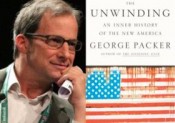 |
NYTimes review: “This book hums – with sorrow, outrage and compassion.”- #8 Best-seller
Q&A: Rebirth of US Manufacturing – James Fallows, Charles Fishman
Written on January 15th, 2015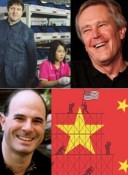 |
Aired: 03/31/13
I do my best to question conventional wisdom, but I had heard and repeated the fact that the US had lost its manufacturing and it was never coming back so often that I assumed it must be true. But I pick up the December 2012 issue of the Atlantic magazine recently and two articles jump out at me – both declaring that manufacturing is re-emerging. James Fallows writes of US startups exploiting new technologies to speed up the process of design-to-product, and Charles Fishman writes about US corporations like GE moving production back to the US.
James Fallows’ article, Mr. China Comes to America, opens with these words: “For decades, every trend in manufacturing favored the developing world and worked against the Unites States. But new tools that greatly speed up development from idea to finished product encourage start-up companies to locate here, not in Asia.” That got my attention! Charles Fishman’s article The Insourcing Boom goes even a step further. It’s opening words: “After years of offshore production, General Electric is moving much of its far-flung appliance-manufacturing operations back home. It is not alone.”
I make no bones about the fact that I like to report good news, but I don’t want to make nice or play Pollyanna. This information from these reporters strikes me as the real thing and I’m only too glad to admit I may have prematurely buried “made in America”.
James Fallows www.jamesfallows.com
Charles Fishman www.thebigthirst.com
Q&A: DAVID GOLDHILL, AUTHOR- CATASTROPHIC CARE: How American Health Care Killed My Father And How We Can Fix It
Written on October 31st, 2014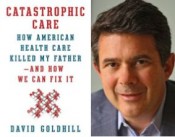 |
Aired: 02/03/13
This week, my guest is DAVID GOLDHILL. After the death of his father, Goldhill, a business executive, began a personal exploration of a health-care industry that for years has delivered poor service and irregular quality at astonishingly high cost.
His September 2009 Atlantic cover story rocked the health-care world, and Goldhill has written a book expanding on the topic, Catastrophic Care: How American Health Care Killed My Father-And How We Can Fix It. It is a system, he argues, that is not worth preserving in anything like its current form. He asserts Obamacare will not fix it, and offers his own radical solution.
* As a nation, we now spend almost 18% of our GDP on health care.
* In 1966, Medicare and Medicaid made up 1% of total government spending; now that figure is 20%.
* The federal government spends
– 8 times as much on health care as it does on education
— 12 times what it spends on food aid to children and families
— 30 times what it spends on law enforcement
— 78 times what it spends on land management and conservation
— 87 times the spending on water supply
— 830 times the spending on energy conservation.
* For every two doctors in the U.S., there is now one health-insurance employee-more than 470,000 in total. In 2006, it cost almost $500 per person just to administer health insurance.
Free Forum Q&A : JANE McGONIGAL, REALITY IS BROKEN – How Gamers Can Change the World
Written on October 17th, 2014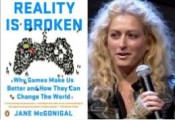 |
In her There are 183 million active video gamers in the US, and the average young person will spend 10,000 hours gaming by the age of 21. There are now more than five million “extreme” gamers” in the US who play an average of 45 hours a week.
According to game designer JANE McGONIGAL, this is because videogames are increasingly fulfilling genuine human needs. But she goes way beyond that, in her first book, REALITY IS BROKEN– just out in paperback – she suggests we can use the lessons of game design to fix what is wrong with the real world.
Drawing on positive psychology, cognitive science, and sociology, she shows how game designers have hit on core truths about what makes us happy so that videogames consistently provide the exhilarating rewards, stimulating challenges, and epic victories that are so often lacking in the real world.
I recommend REALITY IS BROKEN to people who have no interest in games. Separate from what it says about the current reality and possible future of games, the book is an excellent primer on what we have learned – and most people don’t know – about happiness, learning, productivity and growth.
Q&A: Frances Moore Lappé, Author – ECOMIND: CHANGING THE WAY WE THINK, TO CREATE THE WORLD WE WANT
Written on October 2nd, 2014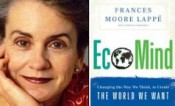 |
Aired: 9/8/13
Originally Aired: 12/30/12
Where do you think the most important changes need to take place to turn things around in terms of big issues like the economy, the environment, and social justice?
Some might say climate change is the critical global issue so it must be clean energy. Others might say nothing will make as much difference for the world’s people as educating and empowering girls and women. Closer to home, a case can be made that public financing of political campaigns would have the most impact on all such issues by making it possible for the power of the United States to become a greater force for good.
All good answers, but this week’s guest gives another answer – and its one that I share. Frances Moore Lappe, who has herself been a force for good at least since the publication of the phenomenal best-seller Diet for a Small Planet in 1971, says that the greatest impact would follow from changing our minds.
In her 18th book, ECOMIND: CHANGING THE WAY WE THINK, TO CREATE THE WORLD WE WANT, Lappé argues that much of what is wrong with the world, from eroding soil to eroding democracies, results from ways of thinking that are out of sync with human nature and nature’s rhythms. Humans are doers, she says. But our capacity for doing is undermined by seven “thought traps” that leave us mired in fear, guilt, and despair — none of which are motivators to action.
Drawing on the latest research in climate studies, anthropology, and neuroscience, she weaves her analysis together with stories of real people the world over, who, having shifted some basic thought patterns, now shift the balance of power in our world. Chapter-by-chapter, Lappé takes us from “thought trap” to “thought leap,” and with each shift, challenges become opportunities.
